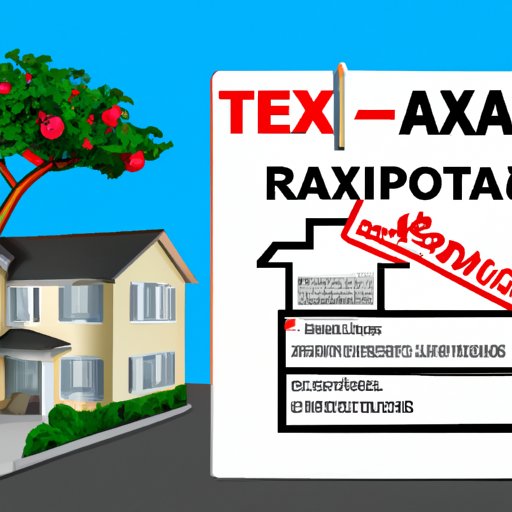Introduction
Investing in real estate is the purchase, ownership, management, rental and/or sale of property for profit. It can be an attractive way to generate income and build wealth. In this article, we’ll explore the benefits and risks of investing in property, different types of real estate investments, associated costs, and how to compare it to other investment options.
Analyzing the Benefits and Risks of Investing in Real Estate
When it comes to investing in real estate, there are both advantages and disadvantages to consider. Let’s take a look at some of the pros and cons.
Advantages of Investing in Property
One of the biggest advantages of investing in property is the potential for appreciation. With the right investment, your property could increase in value over time, allowing you to make a profit when you sell. Additionally, real estate investments can provide a steady stream of income through rental payments. And, depending on the type of investment you choose, you may be able to benefit from tax deductions, such as those for mortgage interest and property taxes.
Disadvantages of Investing in Property
While there can be potential rewards, there are also risks associated with investing in real estate. The most significant risk is that the value of your property could decrease, leading to a financial loss. Additionally, owning property requires ongoing maintenance and repairs, which can be costly. And, like any investment, there is no guarantee of success.

Exploring Different Types of Real Estate Investments
Real estate investments come in many forms, each with its own set of benefits and risks. Here are some of the most common types of real estate investments.
Residential Real Estate Investments
Residential real estate investments involve purchasing residential properties, such as single-family homes, duplexes, triplexes, and fourplexes. These investments can generate income through rental payments, and may appreciate in value over time. However, they can also be costly to maintain and require a significant amount of time and effort.
Commercial Real Estate Investments
Commercial real estate investments involve the purchase of commercial properties, such as office buildings, retail spaces, and warehouses. These investments tend to have a higher potential for appreciation than residential investments, but there are also higher risks involved. Additionally, commercial leases often require more upfront capital than residential leases.
Vacation Rental Investments
Vacation rental investments involve purchasing a property specifically for the purpose of renting it out as a short-term vacation rental. These investments can generate a steady stream of income, but they also require a significant amount of time and effort to manage. Additionally, vacation rentals are subject to local regulations, so it’s important to check with your local government before making this type of investment.

Examining the Costs of Owning Property
When investing in property, it’s important to consider the associated costs. There are both upfront and ongoing costs to consider.
Upfront Costs
The upfront costs of investing in real estate include the purchase price of the property, closing costs, taxes, and insurance. Depending on the type of property you purchase, there may also be additional costs, such as renovations or repairs.
Ongoing Costs
In addition to the upfront costs, there are also ongoing costs associated with owning property. These include mortgage payments, property taxes, insurance, maintenance and repairs, and utility bills. It’s important to factor these costs into your budget when evaluating potential investments.

Understanding Tax Implications for Real Estate Investors
As a real estate investor, it’s important to understand the tax implications of your investments. There are two main types of taxes to consider: income taxes and capital gains taxes.
Income Taxes
Income taxes are taxes paid on rental income generated from a property. As a real estate investor, you will need to report your rental income on your tax return and pay taxes accordingly.
Capital Gains Taxes
Capital gains taxes are taxes paid on the profits realized when a property is sold. Depending on the type of property and the length of time it is held, capital gains taxes may be lower than income taxes. It’s important to consult a tax professional to determine your liability.
Comparing Real Estate vs Other Investment Options
When deciding whether to invest in real estate or another investment option, it’s important to compare the potential risks and rewards. Here are some of the most popular alternatives to real estate investing.
Stocks and Bonds
Stocks and bonds are two of the most common investment options. Stocks represent ownership in a company, while bonds are loans issued by companies or governments. Both stocks and bonds can provide a steady stream of income, but they can also be volatile and risky investments.
Mutual Funds
Mutual funds are a type of investment that pools money from multiple investors and invests it in a variety of stocks, bonds, and other assets. Mutual funds can be a good choice for investors who want diversification without having to make individual stock and bond decisions.
Real Estate Investment Trusts (REITs)
Real estate investment trusts (REITs) are investments that allow investors to buy shares in a portfolio of real estate assets. REITs offer diversification and can provide a steady stream of income, but they also come with their own set of risks.
Evaluating the Market to Make Smart Investment Decisions
No matter which type of real estate investment you choose, it’s important to do your research and evaluate the market before making a decision. Here are some tips for making smart investment decisions.
Researching the Local Market
Before investing in property, it’s important to research the local market to get an understanding of the current trends and conditions. Look at factors such as population growth, job opportunities, housing prices, and rental rates.
Assessing the Risk-Reward Ratio
It’s important to assess the potential risks and rewards of any investment opportunity. Consider factors such as the potential for appreciation, the cost of maintenance, the potential for rental income, and the overall demand for the property.
Seeking Advice from Experts
When investing in property, it’s always a good idea to seek advice from experts in the field. Consider consulting a real estate agent, accountant, lawyer, or financial advisor to get an objective opinion on the potential risks and rewards of a particular investment.
Conclusion
Investing in property can be a great way to generate income and build wealth. By understanding the benefits and risks of investing in real estate, exploring different types of real estate investments, examining the costs of owning property, understanding the tax implications, comparing real estate to other investment options, and evaluating the market, you can make smart investment decisions and maximize your potential for success.
(Note: Is this article not meeting your expectations? Do you have knowledge or insights to share? Unlock new opportunities and expand your reach by joining our authors team. Click Registration to join us and share your expertise with our readers.)
